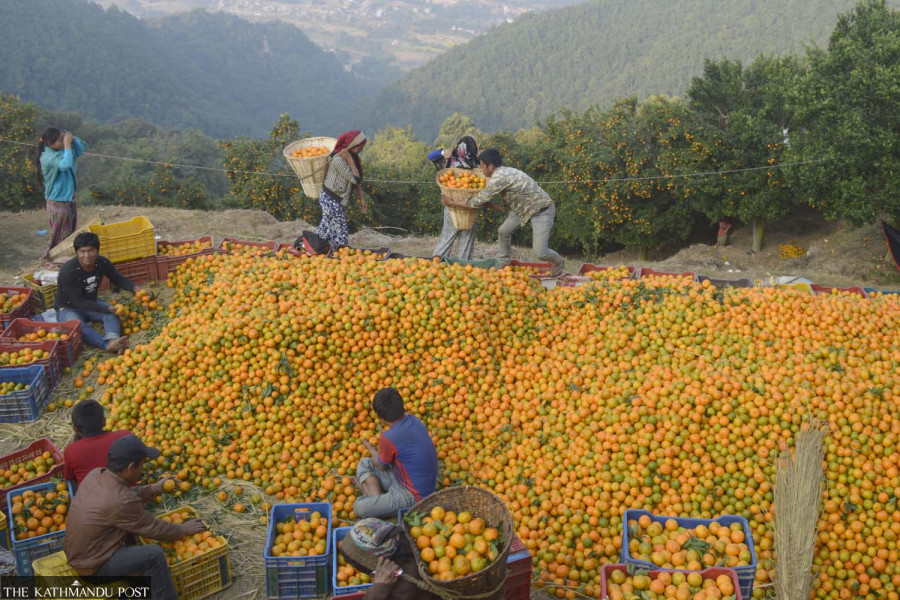Money
Britain offers Nepal special trading preferences
The UK government says Nepal can continue to benefit from Developing Countries Trading Schemes.
Post Report
The British government has assured Nepal of trade facilitation through its Developing Countries Trading Schemes as the nation prepares to graduate from a least developed country (LDC) by 2026.
On Wednesday, Rob Fenn, the British ambassador to Nepal, met Damodar Bhandari, the minister for industry, commerce, and supplies, and informed him that Nepal would be provided with a special trade facility—the Developing Countries Trading Scheme—instead of the generalised system of preference (GSP), which is given to least developed countries.
The scheme was introduced by the UK government in June last year.
The scheme aims to promote sustainable growth in developing countries by using a more generous trade preferences scheme than with other trade partners.
The scheme applies to 65 countries, which fall into three tiers of preferences.
Each category has increasing levels of preferential market access for the countries, meaning that the LDCs get the most generous treatment. The scheme has received a largely positive response, despite some criticism that it did not differ enough from its GSP initiative.
Officials at the ministry said that during the meeting, Bhandari requested the British government to increase the technical assistance targeted for industry and export, which will help the export growth of Nepal.
The meeting also discussed intellectual property rights protection and promotion and bilateral trade and investment between the countries.
The minister expressed commitment to expanding British government partnerships in sectors like interconnection, infrastructure development, energy, trade, tourism, investment, and public-level issues. He also called for Nepal’s readiness to benefit from the UK's experience, knowledge, skill, and technology for the development of industry, hydropower, and education.
During the meeting, Ambassador Fenn said that the UK is willing to work with the private sector and stay close to the government on its development. He committed to supporting the promotion of Nepali exports. Citing the UK's support for a free economy, he said the country will play a major role in connecting Nepal with the global market.
Trade experts, however, argue that developed countries should continue the trade preference facilities during the transition period.
Chandra Ghimire, former secretary at the industry ministry, said that developed countries like the UK need to continue duty-free quota-free market access for LDC graduates during the transition phase or for at least 8 to 10 years.
“This will help the country’s exports do better and prevent the country from experiencing market shocks. For this, Nepal needs to actively negotiate with the market countries.”
Nepal has two and a half years to graduate from the LDC, but the government's work to date is not sufficient, Ghimire said. “The country's national strategy to graduate from LDC is not as comprehensive as it should have been, it is implemented slowly, and it has always been challenging.”
According to the Department of Customs, the total trade between Nepal and the UK increased by 16.21 percent in the last fiscal year, 2022-23, which ended in mid-July, from the previous fiscal year.
Nepal’s exports to the UK increased by 6.73 percent to Rs3.33 billion in the review period, while imports increased by 21.57 percent to Rs5.33 billion.
The country’s trade deficit with the UK remained at Rs2.20 billion.
According to a report, ‘Nepal’s graduation from the LDC category, the implication for international trade and development cooperation,’ published by South Asia Watch of Trade, Economics and Environment in September 2022, Nepal’s merchandise exports could fall by 2.5 percent to 4 percent as a result of increased tariffs upon graduation.
Exports to the European Union (EU) are expected to see the largest losses, assuming that Nepali exports will face ordinary GSP instead of GSP+. Getting GSP+ will significantly reduce export losses in the EU.
The tariff increase analysis, coupled with the existing estimates of the impact on exports, underscores the importance of securing access to the GSP+ and GSP Enhanced Framework(EF) schemes in the EU and the UK, respectively.
The EU’s newly proposed GSP for the period 2024-34 requires the ratification and effective implementation of 32 international agreements, adding five agreements to the current 27 international conventions. Nepal has to ratify and implement 27 conventions to be eligible for the UK’s Export Finance scheme, the same as with the EU's current GSP+ scheme.
According to the report, LDC graduation will have not only tariff implications but also more stringent rules of origin provisions in preference-granting countries, including the EU, the UK, Canada, Australia, and the Russian Federation, among others.
Many products, particularly apparel and made-up textile products, will face more stringent rules of origin in the form of double transformation requirements compared to the single transformation required for the LDCs, the report said.
Readymade garment exporters express concerns that they may not be able to meet the more restrictive rules of origin requirements even if the alternative preference schemes offer preferential tariffs.
Trade experts have been saying that Nepal may lose a huge European market as it might not get facilities under the Everything But Arms (EBA) initiative. This scheme grants full duty-free and quota-free access to the European Union Single Market for all products (except arms and ammunition).
“We might need to go for a GSP+, but it is not easy to get as some criteria like ratifying convention of ILO, which the country has yet to do, and the rules of origin criteria are also not easy,” Purushottam Ojha, former commerce secretary told the Post in a recent interview.
GSP is a special incentive arrangement for sustainable development and good governance.
GSP+ slashes these same tariffs to zero percent for vulnerable low- and lower-middle-income countries that implement 27 international conventions related to labour and human rights, environmental and climate protection, and good governance.




 10.12°C Kathmandu
10.12°C Kathmandu













